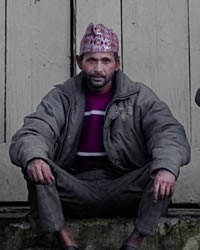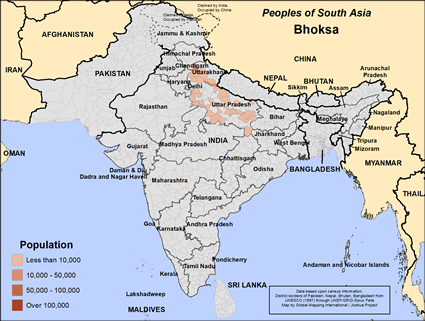The Bhoksa or Buska are a tribal people who live in the foothills of the Himalayas in north central India. The word Bhoksa comes from the word for mountain goat or an edible root. Most Bhoksa are employed in agriculture. They also raise sheep for meat and wool. Goats provide milk, meat and hides. Bhoksa men have some knowledge of reading and writing whereas most woman not do. Some Bhoksa men work as mountain guides for tourists.
The Bhoksa are classified as a Schedules Caste making them eligible for special consideration for public jobs and college admissions.
The primary language of the Bhoksa is their Buksa language. Most men have some knowledge of Hindi so they can communicate with outsiders.
The vast majority of Bhoksa live in the north Indian state of Uttarakhand. A smaller group lives in Uttar Pradesh.
The modern world is slowly coming to the Bhoksa. Most of them still live in rural villages like their ancestors did. A chief along with his council of elders make legal and major economic decisions for the village.
There are more Bhoksa men than women. To gain a bride for its son, a family must demonstrate that the young man can support her by owning some land. They must pay a bride price. The Bhoksa marry within their tribe but not within their particular clan. Cousin marriages are forbidden. Unfortunately, alcoholism is a problem among Bhoksa men. A woman can divorce her husband by returning the bride price.
Some young Bhoksa are leaving the traditional way of life and moving to cities for better economic and educational opportunities.
The main foods for the Bhoksa are fish, rice, wheat, vegetables and milk products.
The Bhoksa are Hindus heavily influenced by folk religion. Their main god is Shankar, another name for Shiva, the destroyer god. Their patron goddess is Chamunda, a form of Durga, the mother-warrior goddess. They also worship Rama and Krishna, avatars of Vishnu, the preserver god. Unlike most tribal peoples, the Bhoksa pay Brahmins to officiate at their important family ceremonies like births, weddings and funerals. The Bhoksa cremate their dead. They Bhoksa believe in evil spirits and ghosts who they try to placate with offerings of food, incense, flowers and prayers. The main yearly holidays of the Bhoksa people are Holi, the festival of colors, Diwali, the festival of lights and Navratri, the celebration of autumn.
The Bhoksa need to hear the life-changing message about Jesus Christ in a way they can understand. They need help in educating their young people, especially their girls. They need the benefits of modern medical care. Agricultural experts could help them increase the crop yield of their lands. The Bhoksa have the New Testament available in their primary language, and the Jesus film is available.
Pray the Lord leads some people to translate the Bible into the Buksa language.
Pray for Bhoksa families and communities to discover and embrace the free gift of life found by trusting Christ and his finished work.
Pray the Lord leads the Bhoksa away from their Hindu and folk religion and into the arms of the loving Savior.
Pray God sends loving Christian workers to serve the Bhoksa.
Scripture Prayers for the Bhoksa in India.
en.wikipedia.org/wiki/Bhoksa_people
http://alokchantia1.blogspot.com/2009/09/bhoksa-tribe.html
journalijar.com/uploads/968_IJAR-18996.pdf
| Profile Source: David Kugel |











